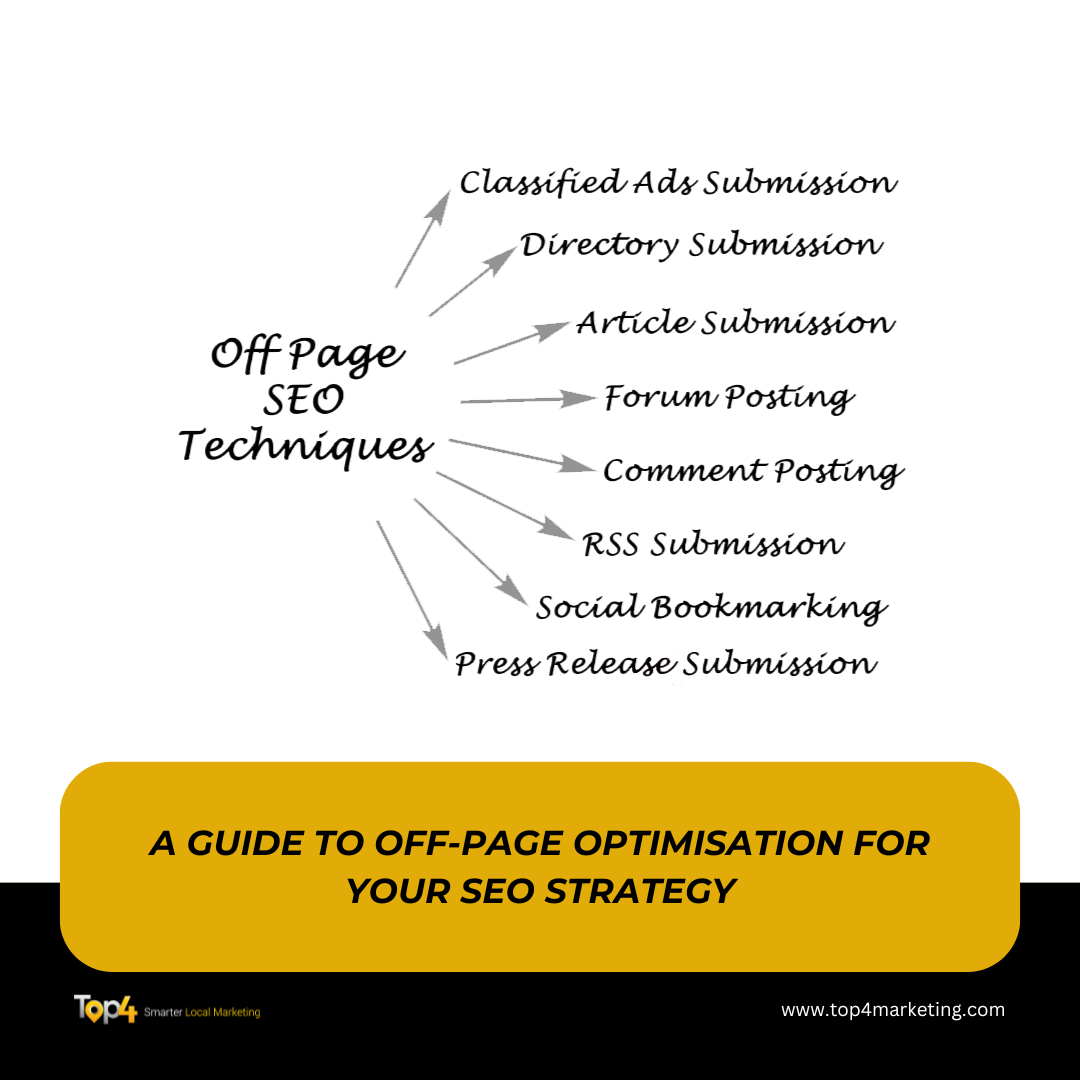Many businesses are seeking ways to improve their online presence and trying to connect with a wider audience. For businesses that invest in SEO, they often only focus on on-page strategies, such as optimizing keyword and content quality, but that’s not enough to get a higher ranking in search engine results. This now brings us to an important element of an integrated approach to SEO: off-page optimization. What is off-page optimization, and how does it fit into your general SEO tactics? In this article, we discuss off-page optimization and how you can make it help your business gain more visibility, authority, and user engagement.
Understanding Off-Page Optimisation
Off-page optimisation includes everything an SEO strategy does outside of your website to improve search engine results. While on-page SEO focuses on keywords, content, and meta tags internal to your website, off-page focuses on building a credible and trustworthy online presence through external factors. The idea is to drive more traffic from sources such as other sites, platforms, and users back to your site, which demonstrates value and relevance to Google.
Other major elements of off-page optimisation include backlinks, social media marketing, collaborations with local influencers, and content marketing on third-party platforms. These tactics work together to help search engines understand that your website is an authority in its niche, as each one collectively supports the other. This will improve your ranking and enhance your brand awareness, and will also support finding new leads.
Why Off-Page Optimisation is Critical to a SEO Strategy
Off-page optimisation is part of any good SEO strategy, as it will reflects how the search engine will perceive the authorit, relevance, and trustworthiness of your website. While on-page SEO focuses on increasing the visibility of your content through keyword optimisation on your website, off-page SEO deals with external elements that show the quality and value of your website on the wider web. Here’s a breakdown of why off-page optimisation is important to any business in digital marketing effort:
- Authority and Credibility
Search engines give websites more trust and credibility. Off-page strategies, such as backlinks from familiar sites and collecting positive reviews, signal that your website is trusted by others and increase its authority in your niche. The better the authority, the better the ranking, which can increase organic traffic.
- Increasing Reach and Driving Traffic
Off-page optimisation techniques involve social networking, influencer marketing, and guest blogging to reach an audience beyond the business website. After all, these techniques drive new visitors to your site, perhaps with the intention of converting them into leads or customers. With more users using your brand across multiple platforms, this is a signal to search engines that your content is relevant and has value.
- Visibility and Prevalence-Based Brand Building
Consistent off-page efforts will lead to brand building, making your business much more recognisable and trusted by consumers. It means that every time the user goes through social media, industry blogs, or review websites, seeing the same brand across all will build familiarity and trust in a brand-the major beneficiaries of user decision-making and search engine ranking.
- Influencing long-term success with SEO
Off-page SEO does not deliver instant results, but the effect is progressive. A proper backlink profile created, active social presence, and relationship with influencers develop such an online presence that’s hard to break. And with this, a base is laid down for long-run SEO performance from which businesses can benefit through continued visibility and engagement.
The Challenges of Off-Page Optimisation
Carrying out an effective off-page optimization strategy can be overwhelming to small business owners. Unlike large enterprises that have a dedicated marketing team and large budgets, small businesses usually have limited resources and time. As in off-page SEO, building external links requires consistency and effort in order to engage with social media and build trust from customers via third-party validation, which stretches already thin resources.
Following are some of the common problems that small businesses could have with off-page SEO:
- Insufficient Budget for Quality Backlink
Getting backlinks from reputed sites may involve various partnerships or collaborations which may be beyond the budget of a small business. High-quality backlinks from authoritative sites will go a long way in improving SEO. In many cases, these links are also extremely expensive or are difficult to get for beginners.
- Time-consuming to Create Content and Perform Outreach
Off-page SEO is not a one-time thing; it involves continuous creation of content, outreach, and relation building. For most small business owners already managing a bunch of responsibilities, consistently creating content, reaching out to other sites, and engaging the audience on various platforms is tough.
- Challenges in Building a Brand Presence on Social Media
While social media is an effective off-page SEO tool, building a following from scratch takes time and strategic planning. Quite demanding for a small business to continually take part, share relevant content, and build up an audience base, which does take a great deal of time, patience, and adaptability.
- Difficulty with earning trust and reviews
When it comes to smaller businesses, it’s usually particularly difficult at the beginning to establish credibility and earn reviews to bring in new customers. Notably, good local SEO is hard to achieve, even entering competitive markets, without a stream of positive feedback on Google My Business.
Overcoming such challenges requires an approach tailored to the particular resources and goals of each small business. The small businesses can only work out their online presence, brand credibility, and observable results over some time by gradual inclusion of off-page SEO tactics that meet their needs.
Backlinking: The Foundation of Off-Page SEO
One of the most important elements of off-page optimisation includes backlinks. In other words, these are inbound links from other websites, and search engines look at them as some form of endorsement from authoritative sources. It is an indication that your content is of importance and one can refer to it without any problem. Of course, not all backlinks are equal. Here’s what businesses should consider when pursuing backlinks:
- Quality trumps quantity
A couple of backlinks from high-authority websites mean much more than hundreds of links from low-quality ones. Google gives more emphasis to the quality of the backlinks than to the number of links to your website. Therefore, it is vital to focus your efforts on renowned websites relevant to your industry.
- Natural link building
Search engine algorithms are smart enough to notice what is and is not natural in link building. Buying backlinks in bulk surely is not organic. Go for organic growth via actual relations with other businesses, publications, or influencers.
- Anchor Text Optimisation
Anchor text is important, too. Anchor keywords may add to relevance, but too much repetition makes the anchor text linked look spammy. Therefore, it is better to temper keywords with natural language so that links may appear as organic and useful.
Building a healthy backlink profile is a long-term process but a worthy investment in improving the rankings of a search engine.
Setting Up Content Marketing for Off-Page SEO
Off-page optimisation mainly relies on content marketing, especially when published in other websites. This is a high-value relevant content that helps in branding a company as an authority in the field. Business can utilise content marketing in off-page optimisation through the following ways:
- Guest Blogging
Publishing of an article in a high authority site can help increase your visibility and get quality backlinks. This is also an opportunity to reach out to new audiences; hence it improves the site’s visibility and credibility.
- Producing Shareable Content
Utility and information-heavy content is usually shared amongst social media and other networks. Examples include how-to guides, case studies, lists, infographics, and industry insight.
- Linkable Assets
Deep resources comprising eBooks, research studies, and whitepapers can assist other sites to link into your website. In that manner, businesses can establish them as sources of knowledge within that industry.
Done right, there is also a spillover of natural link building and brand reinforcement that follows from content marketing, two important pieces of a strong off-page SEO foundation.
Online Reviews and Reputation Management
Online reviews are a part of off-page optimisation, which builds trust and credibility. Positive online reviews attract not only potential customers but affect SEO also, as they give signals to search engines about the quality and reliability of your services. Here’s how to use online reviews for off-page optimization:
- Google My Business Reviews
Positive Google My Business reviews improve the local search ranking of any business, especially for local businesses. Encourage happy customers to provide feedback that can strengthen your brand reputation and make it appear in local searches.
- Third-Party Review Site
Top4 and others third party tools, among other industry-specific review platforms, bring more credibility to your business. In managing them proactively, you build a positive image while generating organic traffic.
- Customer Feedback
Engaging in customer feedback, positive or negative, on a regular basis depicts accountability and helps to make your brand image better. Search engines like engaging brands with users in a positive way, helping indirectly in SEO too.
A good reputation on these platforms develops consumer trust and forms a very important social proof for new visitors.
Building a Diverse Off-Page SEO Strategy
A fully rounded off-page SEO strategy requires a balance in the different methods for maximum visibility, authority, and user engagement. Here’s a breakdown of a few more elements to consider:
- Forum Participation
Industry-specific forum and community involvement can help build knowledge and drive traffic to the website. Answering questions or responding to discussions positions your brand as a knowledgeable player in the field.
- Influencer Marketing
Influencers who review or advocate your products/services expose your brand to new audiences that can create links and build engagement for you.
- Affiliate Marketing
Affiliates that you partner with and link back to your website can bring in quality backlinks while exposing your brand to audiences you cannot reach otherwise.
Conclusion
Off-page optimisation is a significant part of any robust SEO strategy that focuses on backlinks, social media engagement, content marketing, and reputation management-talking about the ideal way through which businesses can build their online presence, get new customers, and increase in search engine rankings. Time and strategic planning, therefore, are indeed essential requirements for effective off-page SEO strategy whereby businesses can make lasting impressions and be viewed as authorities in their field of business. These strategy, as part of the prolonged campaign of SEO, will benefit your brand development through building a reliable web appearance for both search engines and customers.
At Top4 Marketing, our expertise can help you craft a local marketing plan that aligns with your business goals and local community needs. Let us assist you in maximising your online strategy. Visit Top4 Marketing blog for more insights to elevate your business to new heights. Contact us today and start your journey towards local marketing success.




























